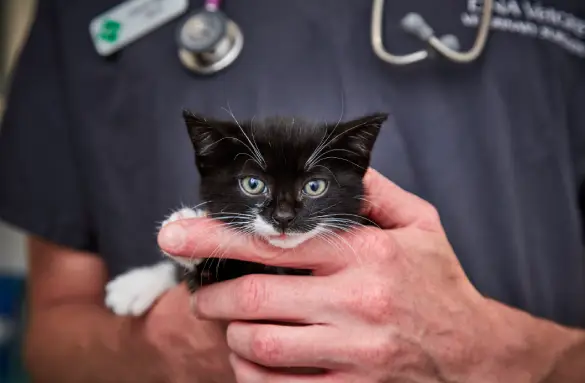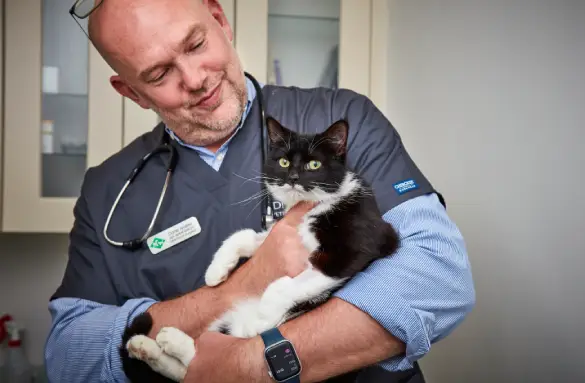Protect your kitten or cat from serious diseases like feline panleukopenia and feline calicivirus with regular cat vaccinations.
At The Vet on Richmond Hill, we provide expert care to ensure your cat receives the right vaccines at the right time.
Available to residents in Richmond and the surrounding areas of Sheen, Hounslow, Brentford, Whitton, and Twickenham.

How Do Cat Vaccines Work?
Cat vaccines stimulate the immune system to recognize and fight specific diseases.
They contain harmless versions of viruses (no bacteria are used in cat vaccines), prompting the body to produce antibodies without causing illness. This allows the immune system to respond effectively if exposed to the actual disease later, offering long-term protection.
We use a minimal vaccination protocol, giving your cat the minimum number of vaccines required to provide effective coverage.
Essential cat vaccinations
Our Richmond Hill team offers the following core vaccines to safeguard your cat’s health:
- Feline herpesvirus (FHV) vaccine
- Feline calicivirus (FCV) vaccine
- Feline panleukopenia (FPV) vaccine
- Feline leukaemia (FeLV) vaccine (for at-risk cats)
- Rabies vaccine
For indoor cats, we usually recommend the “flu vaccination” only (herpes and calicivirus), unless there is uncertainty about their indoor/outdoor status or if they are in a multi-cat household, in which case FeLV vaccination may also be appropriate.

Cat Vaccination Costs
Vaccination costs depend on your cat’s age and the vaccines required. Ask about our Vaccine Amnesty program, offering two injections for the price of one booster.
Cat Vaccinations FAQ
What happens at a vaccination appointment?
Before administering any vaccine, we perform a full health check to ensure your cat is fit for vaccination. We’ll assess their individual needs based on age, health status, and lifestyle.
We’ll also consider local risks, such as exposure to other cats in Richmond Hill, and discuss any travel plans or boarding needs.
We typically administer vaccines via injection under the skin, though some may be given intranasally. After vaccination, we monitor your cat briefly for any immediate reactions.
Are cat vaccinations safe?
Yes! Side effects are rare, but we monitor every cat closely.
What are the side effects of cat vaccines?
Common side effects include mild lethargy, slight fever, localised swelling, or a decreased appetite. In rare cases, cats may have allergic reactions such as facial swelling, hives, vomiting, or difficulty breathing.
If your cat displays these symptoms, contact us immediately.
Can a vaccine cause a lump on a cat?
Yes, a vaccine can cause a small lump at the injection site on a cat. This is a common reaction due to mild inflammation or localised immune response and usually resolves within a few weeks.
If the lump grows, persists for more than three months, becomes painful, or changes in shape, please get in touch. Persistent lumps are very rare but could indicate a more serious condition, such as a vaccine-associated sarcoma.
How long do cat vaccine side effects last?
Cat vaccine side effects are usually mild and last 24 to 48 hours. If symptoms persist beyond 48 hours or worsen, get in touch with our team
How often should cats be vaccinated, and how long can you leave it between vaccinations?
Kittens normally receive their first vaccinations at approximately 9 weeks, followed by a second dose at 12 weeks, and a booster at 12 months. After that, annual flu vaccines are recommended.
We recommend keeping up flu vaccines even for cats that stay indoors, as the risk of cat flu being brought in on clothing, footwear, or during vet visits still exists.
Do indoor cats need vaccines?
Yes, indoor cats still need vaccines. While they are less exposed to some risks compared to outdoor cats, they can still be vulnerable to diseases like feline calicivirus, feline herpesvirus, and panleukopenia.
Indoor cats can also get exposed through human contact or other pets that come into the home.
Regular check-ups with your vet can help determine the best vaccination plan for your indoor cat.
What’s a titre test for cats?
A titre test measures the level of antibodies in your cat’s blood to determine immunity against diseases like feline calicivirus, panleukopenia, or rabies.
It’s often used as an alternative to booster vaccines, particularly for cats that are already vaccinated.
This test ensures your cat still has sufficient immunity, preventing over-vaccination while maintaining protection.
Catch Up On Your Cat’s Missed Vaccinations
Has your cat missed a vaccination? Take advantage of our vaccine amnesty and bring them up to date for the price of a booster.
Join our VIP Plan
For cost-effective preventative care, join our VIP Healthcare Plan when you bring your cat in for vaccinations. Spread the cost of essential treatments and enjoy peace of mind.
Schedule an appointment today and keep your cat healthy and protected. The Vet on Richmond Hill is here for you and your pet!



